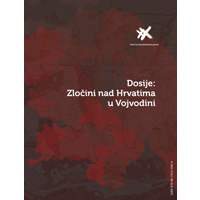
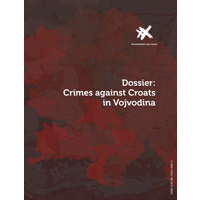 In the period 1991-1995, in the territory of the Autonomous Province of Vojvodina, there was a campaign of intimidation and pressure on Croatian civilians with the aim to force them to leave their homes, and Serbia as well. The campaign, the intensity of which changed and reached its highest peaks in the second half of 1991, from spring to autumn 1992 and in summer of 1995, resulted in the expulsion of several tens of thousands of Croats from Vojvodina. Violence against Croats in Vojvodina included attacks on their private property and religious buildings, as well as threats, physical attacks and murders.
In the period 1991-1995, in the territory of the Autonomous Province of Vojvodina, there was a campaign of intimidation and pressure on Croatian civilians with the aim to force them to leave their homes, and Serbia as well. The campaign, the intensity of which changed and reached its highest peaks in the second half of 1991, from spring to autumn 1992 and in summer of 1995, resulted in the expulsion of several tens of thousands of Croats from Vojvodina. Violence against Croats in Vojvodina included attacks on their private property and religious buildings, as well as threats, physical attacks and murders.
Vojislav Šešelj and his Serbian Radical Party (SRS) were the main advocates and inspirers of the campaign of intimidation and pressure on the Croat population in Vojvodina. The persecution of Croatian families was carried out under the pressure of various groups close to the SRS, composed of the local population, a militant part of the Serbian refugees from Croatia, and of members of volunteer units from Serbia who had participated in the wars in Croatia and Bosnia and Herzegovina.
This intimidation campaign took place with the awareness and tacit approval of the political structures of the Republic of Serbia. The evidence presented in this Dossier shows that in some acts of violence against Croats, persons from the Ministry of Internal Affairs (MUP) of the Republic of Serbia also took part. In addition, in the forced eviction of Vojvodina Croats, the State Security Department (RDB) of the MUP of the Republic of Serbia played a significant role.
In the period between the two population censuses of 1991 and 2002, the number of Croats and members of other non-Serb populations in the territory of Vojvodina was noticeably reduced. The number of Croats was reduced in 39 out of 45 municipalities in Vojvodina; and across the territory of the entire Vojvodina, the number of Croats decreased by 18,262, i.e. by 24.41%.
In this Dossier, evidence of events in certain Vojvodina municipalities (Ruma, Šid, Stara Pazova, Inđija, Petrovaradin and Apatin) has been presented, showing how strong the pressure on the Croats to emigrate was, and where the ethnic picture was changed the most. The Dossier is based on the testimonies of witnesses and families of victims given to the Humanitarian Law Center, RDB documents, judgments of the courts in Serbia, and documents presented to the International Criminal Tribunal for the former Yugoslavia, as well as media reports.
Dossier: Crimes against Croats in Vojvodina is available here.
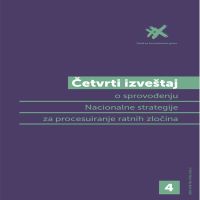
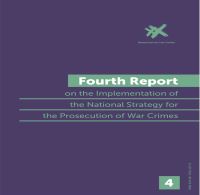 The Humanitarian Law Center (HLC) has been monitoring and providing support to war crimes trials ever since the first war crimes proceedings conducted in Serbia in 2002. The HLC is the only organization that has been continuously monitoring and analyzing war crimes trials in Serbia and informing the public at home and abroad about them. HLC has been filing criminal complaints against suspected perpetrators and sharing its documentation on war crimes with the Office of the War Crimes Prosecutors (OWCP). Also, the HLC has been identifying witnesses and victims and encouraging them to give evidence in court and thus contribute to achieving justice for past crimes.
The Humanitarian Law Center (HLC) has been monitoring and providing support to war crimes trials ever since the first war crimes proceedings conducted in Serbia in 2002. The HLC is the only organization that has been continuously monitoring and analyzing war crimes trials in Serbia and informing the public at home and abroad about them. HLC has been filing criminal complaints against suspected perpetrators and sharing its documentation on war crimes with the Office of the War Crimes Prosecutors (OWCP). Also, the HLC has been identifying witnesses and victims and encouraging them to give evidence in court and thus contribute to achieving justice for past crimes.





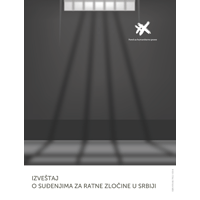
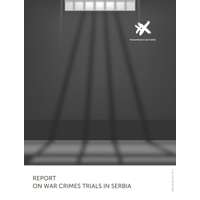 This is the seventh report of the Humanitarian Law Center (HLC) on war crimes trials in Serbia. The HLC has monitored all war crimes trials conducted in the territory of Serbia during 2017 and 2018, a total of 20 trials, conducted by the War Crimes Departments of the Higher Court in Belgrade or the Court of Appeal in Belgrade, including one trial conducted by a court of general jurisdiction. A brief overview of all cases observed, and the HLC’s key findings on each case of interest to the public, are provided in the Report.
This is the seventh report of the Humanitarian Law Center (HLC) on war crimes trials in Serbia. The HLC has monitored all war crimes trials conducted in the territory of Serbia during 2017 and 2018, a total of 20 trials, conducted by the War Crimes Departments of the Higher Court in Belgrade or the Court of Appeal in Belgrade, including one trial conducted by a court of general jurisdiction. A brief overview of all cases observed, and the HLC’s key findings on each case of interest to the public, are provided in the Report.
 In the period 1991-1995, in the territory of the Autonomous Province of Vojvodina, there was a campaign of intimidation and pressure on Croatian civilians with the aim to force them to leave their homes, and Serbia as well. The campaign, the intensity of which changed and reached its highest peaks in the second half of 1991, from spring to autumn 1992 and in summer of 1995, resulted in the expulsion of several tens of thousands of Croats from Vojvodina. Violence against Croats in Vojvodina included attacks on their private property and religious buildings, as well as threats, physical attacks and murders.
In the period 1991-1995, in the territory of the Autonomous Province of Vojvodina, there was a campaign of intimidation and pressure on Croatian civilians with the aim to force them to leave their homes, and Serbia as well. The campaign, the intensity of which changed and reached its highest peaks in the second half of 1991, from spring to autumn 1992 and in summer of 1995, resulted in the expulsion of several tens of thousands of Croats from Vojvodina. Violence against Croats in Vojvodina included attacks on their private property and religious buildings, as well as threats, physical attacks and murders.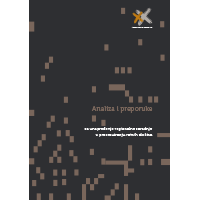
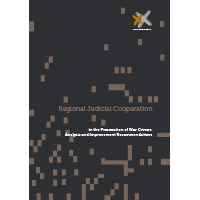 In consequence of the cross-border nature of the armed conflicts in the former Yugoslavia, victims, witnesses, perpetrators and evidence are not for the most part located within the territory of a single state and do not fall within the competence of a single national judiciary. Additionally, due to the fact that almost all former Yugoslavia successor states ban the extradition of their own nationals to face trial in other countries, prosecution of war crimes is unthinkable without an effective cooperation among the countries in the region. Given the importance of the fight against impunity for war crimes, regional cooperation is among the key commitments that Serbia undertook as part of its European Union (EU) Accession negotiations.
In consequence of the cross-border nature of the armed conflicts in the former Yugoslavia, victims, witnesses, perpetrators and evidence are not for the most part located within the territory of a single state and do not fall within the competence of a single national judiciary. Additionally, due to the fact that almost all former Yugoslavia successor states ban the extradition of their own nationals to face trial in other countries, prosecution of war crimes is unthinkable without an effective cooperation among the countries in the region. Given the importance of the fight against impunity for war crimes, regional cooperation is among the key commitments that Serbia undertook as part of its European Union (EU) Accession negotiations.
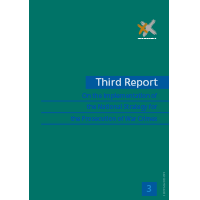 The Humanitarian Law Center (HLC) has been monitoring and providing support to war crimes trials ever since the first war crimes proceedings conducted in Serbia in 2002. The HLC is the only organization that has been continuously monitoring and analysing war crimes trials in Serbia and informing the public at home and abroad about them. It has been representing victims (injured parties) in war crimes cases through an Attorney, filing criminal complaints with the Office of the War Crimes Prosecutors (OWCP) against suspected perpetrators, and sharing its documentation on war crimes. Also, the HLC has been identifying witnesses and victims and encouraging them to give evidence in court and thus contribute towards achieving justice for past crimes.
The Humanitarian Law Center (HLC) has been monitoring and providing support to war crimes trials ever since the first war crimes proceedings conducted in Serbia in 2002. The HLC is the only organization that has been continuously monitoring and analysing war crimes trials in Serbia and informing the public at home and abroad about them. It has been representing victims (injured parties) in war crimes cases through an Attorney, filing criminal complaints with the Office of the War Crimes Prosecutors (OWCP) against suspected perpetrators, and sharing its documentation on war crimes. Also, the HLC has been identifying witnesses and victims and encouraging them to give evidence in court and thus contribute towards achieving justice for past crimes.
 On October 16, 2018, the Humanitarian Law Center (HLC) filed a criminal complaint with the Office of the War Crimes Prosecutor (OWCP) of the Republic of Serbia against several unknown persons, for killing three members of the Matijević family in April 1992 in Kukujevci (Municipality of Šid, Serbia).
On October 16, 2018, the Humanitarian Law Center (HLC) filed a criminal complaint with the Office of the War Crimes Prosecutor (OWCP) of the Republic of Serbia against several unknown persons, for killing three members of the Matijević family in April 1992 in Kukujevci (Municipality of Šid, Serbia).

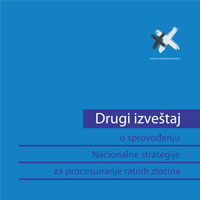
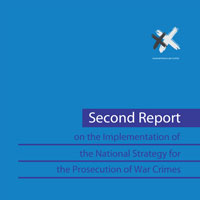 The Humanitarian Law Center (HLC) has been monitoring and providing support to war crimes trials ever since the first war crimes proceedings conducted in Serbia in 2002. The HLC is the only organization that has been continuously monitoring and analysing war crimes trials in Serbia and informing the public at home and abroad about them. It has been representing victims (injured parties) in war crimes cases through an Attorney, filing criminal complaints with the Office of the War Crimes Prosecutors against suspected perpetrators, and sharing its documentation on war crimes. Also, the HLC has been identifying witnesses and victims and encouraging them to give evidence in court and thus contribute to achieving justice for past crimes.
The Humanitarian Law Center (HLC) has been monitoring and providing support to war crimes trials ever since the first war crimes proceedings conducted in Serbia in 2002. The HLC is the only organization that has been continuously monitoring and analysing war crimes trials in Serbia and informing the public at home and abroad about them. It has been representing victims (injured parties) in war crimes cases through an Attorney, filing criminal complaints with the Office of the War Crimes Prosecutors against suspected perpetrators, and sharing its documentation on war crimes. Also, the HLC has been identifying witnesses and victims and encouraging them to give evidence in court and thus contribute to achieving justice for past crimes.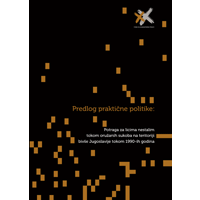
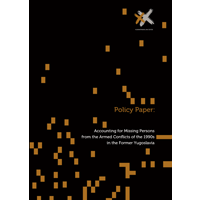 The wars fought in the former Yugoslavia during the 1990s have left dire long-term consequences that the successor states of the former Yugoslavia will have to deal with for years to come. These states have yet to meet the challenge of dealing with systematic violations of human rights and of building democratic institutions, tasks that cannot be accomplished without taking a responsible approach towards dealing with the violent past. Such an approach is impossible without establishing the fate of the persons who are still unaccounted for as a result of the past armed conflicts.
The wars fought in the former Yugoslavia during the 1990s have left dire long-term consequences that the successor states of the former Yugoslavia will have to deal with for years to come. These states have yet to meet the challenge of dealing with systematic violations of human rights and of building democratic institutions, tasks that cannot be accomplished without taking a responsible approach towards dealing with the violent past. Such an approach is impossible without establishing the fate of the persons who are still unaccounted for as a result of the past armed conflicts.